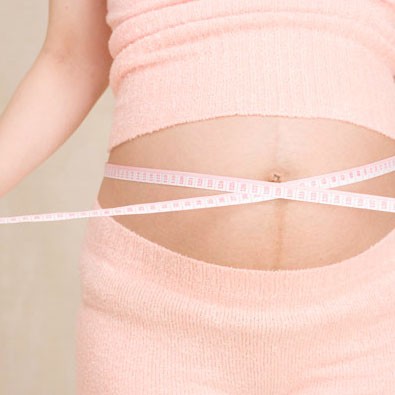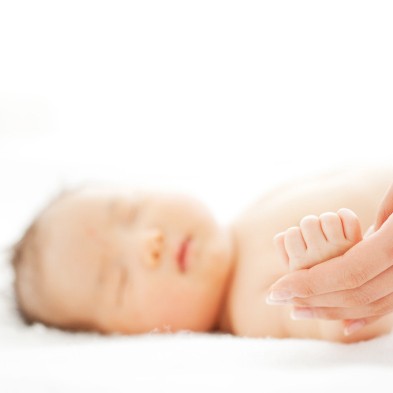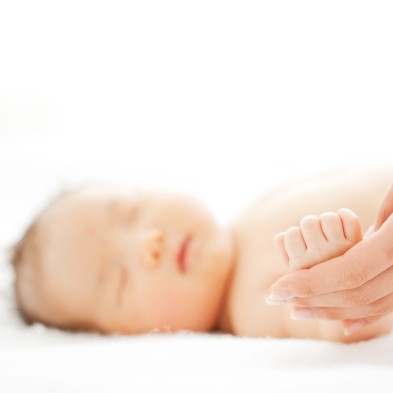"Am I Pregnant!?" for the First Time
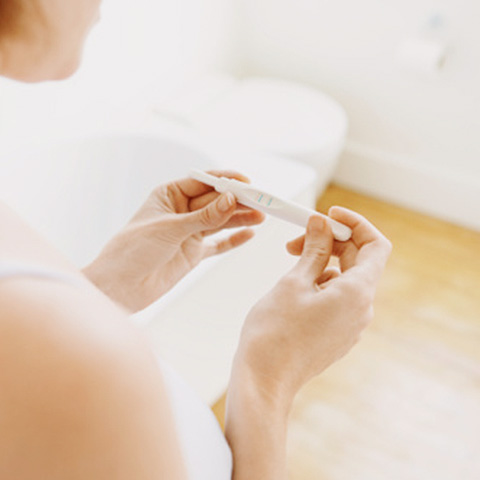
Could this mean I'm pregnant?
Women vary in catching the signs of pregnancy, but if you feel the signs, you can check with a pregnancy test now, so go ahead and use one.
Signs of pregnancy-1 If you know your menstrual cycle
Most women notice the signs of pregnancy after their menstruation is late.
Those whose menstrual cycle is accurate or who are recording their basal body temperature to are considered to have an easier time catching the signs of pregnancy.
Menstruation is late (or stops)
For those whose menstrual cycle is accurate, if menstruation does not begin even a week after it's expected to, you can generally assume you're pregnant.
But women's bodies are very delicate.
Even if it's usually accurate, changes in the environment or emotional stress or shock may cause menstruation to be late or to stop.
While thinking back if you may have had those kinds of factors, take a look at the other signs on the next page.
High-temperature phase of basal body temperature continues
Even if it's not for the purpose of getting pregnant, some women record their basal body temperatures because of irregular menstruation.
Usually, the body temperature drops on the day menstruation is expected to begin, but if you're pregnant, the temperature doesn't drop and the high-temperature phase continues.
For those who continually record their basal body temperature and can clearly discern the high-temperature phase (about 2 weeks from the day of ovulation) and the low-temperature phase (about 2 weeks from the day menstruation is expected to begin to the day of ovulation), if the high-temperature phase, which usually lasts about 2 weeks, continues even after 3 weeks, chances are high that you're pregnant.
Naturally, this does not apply if you have a fever due to a cold or other reason.
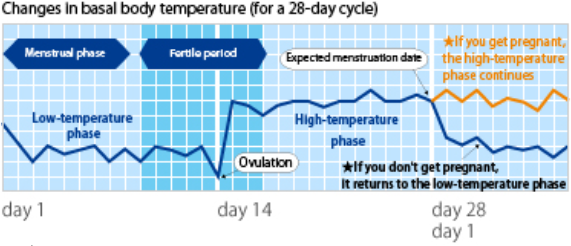
Signs of pregnancy-2
If you don't know your menstrual cycle (or it's irregular, etc.)
For those whose menstrual cycle is irregular,if menstruation is absent and you notice the following signs,consider the possibility that you may be pregnant, and go see your gynecologist or try a pregnancy test.
You feel sick to your stomach ("morning sickness")
In some cases even when menstruation is just a little late, you may feel sick to your stomach or experience symptoms of what is known as "morning sickness." You may feel nauseous, or you may be bothered by the smell of food, for example. Symptoms vary for different people.
Nipples become sensitive
The nipples may become sensitive, and you may notice an uncomfortable tingling or stinging feeling when they touch your undergarments or clothing.
You need to go to the bathroom frequently
When you're pregnant, your uterus becomes larger and presses on your bladder, making you need to go to the bathroom (to urinate) more often. That said, for the same reason, some women become constipated.
Skin breaks out
Due to changes in the hormone balance, skin may break out and melanin pigmentation may increase, causing freckles and dark spots to become more noticeable and nipples to become darker.
You feel feverish
Because the high-temperature phase of your basal body temperature is continuing longer, you may feel feverish and wonder if you have a cold.
You have increased vaginal discharge
Hormones cause vaginal secretions to increase, which leads to an increase in the amount of vaginal discharge. The discharge in this case is usually a milky color and sticky, but it does not have a strong odor.
Your body feels sluggish or becomes irritable
Due to changes in the hormone environment, your body may feel sluggish, you may lack energy, you may become emotionally unstable and irritable, or you may feel like crying for no apparent reason.
Use a pregnancy test and check
For those who have never been to a gynecologist before, it takes courage to go to one when you're uncertain.
It's a place everyone goes to when they're pregnant, and a diagnosis by a specialist is the most certain.
But nowadays, you can check things out easily at home.
First, try a pregnancy test.
How a pregnancy test works
When you're pregnant, a hormone called "human Chorionic Gonadotropin", or hCG, begins to be secreted in large quantities into the urine from the placental villous cells, which form the basis of the placenta. Pregnancy tests are designed to take advantage of that mechanism.
Types of pregnancy tests
You can get a pregnancy test at a pharmacy.
All of them consist of a reagent contained in a stick of some sort, and you urinate on the stick or place it into a container of urine to get the results. For some, you know if the result is positive or not by a change in color, and for others, there is a digital display that tells you clearly if it is positive or negative.
Most types can determine if you're pregnant or not from about 1 week after your expected date of menstruation, but some can be used as early as the same day that menstruation was expected to start.
When the results appear...?
●If it's positive
Pregnancy tests today are high-quality and can usually make an accurate determination. If it's positive, the chance that you are pregnant is very high, so get checked by a gynecologist as soon as possible.
*Pregnancy tests will work even in the case of an ectopic pregnancy. To know if your pregnancy is without problems, you need to get checked as soon as possible.
●If it's negative
You may not have used the text correctly, or it may be too early, so if the signs of pregnancy continue, try a test again on another day or get checked by a gynecologist.
*Read the instructions enclosed with the pregnancy test carefully before use.
update : 19.09.2017
Our favorites feature uses your browser's cookies. To use this feature, please enable cookies. If you are using Safari on your iPhone or iPad, please turn off the Private Browsing Mode. If you clear the cookie, you also clear the Favorite that you chose.
















.png)
